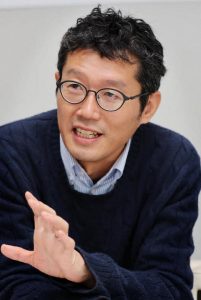Questions from the Marshall Islands 70 years after Bikini Atoll disaster, Part 5: Interview with Seiichiro Takemine, professor, Meisei University
Mar. 17, 2024
How to leave record of experience is important issue
by Michio Shimotaka, Staff Writer
Seiichiro Takemine, a professor at Meisei University in Tokyo, visited the Marshall Islands in the central Pacific Ocean region during the period February 25¬–March 14. The aim of Mr. Takemine’s visit was to speak with local residents about the damage from radiation and their daily lives. It was Mr. Takemine’s 19th visit to the island nation as part of research he has conducted since 1988. The Chugoku Shimbun interviewed Mr. Takemine about the challenges faced today, 70 years after the Japanese tuna fishing boat Daigo Fukuryu Maru (in English, ‘Lucky Dragon No. 5’) and other vessels were exposed to radiation from the “Castle Bravo” nuclear test the United States conducted on Bikini Atoll, and about how Japan and other countries should deal with the situation.
The number of island residents who experienced the nuclear tests is decreasing. How do you see the current situation in terms of passing on the experience to others?
People have been taught about what members of their own community experienced what, but they do not fully understand the situation in other parts of their country or how it all connects to the international community. The residents need to acquire more expansive knowledge about the issue.
In a culture in which stories are passed down orally, one important issue is how to preserve knowledge of the experience in a formal record. In Japan, the term international cooperation probably conjures images of financial and other support, but simply addressing the issue also represents a contribution of sorts.
“Poison was spread”
What is the situation on Ailuk Atoll, which the United States has not recognized as an affected area despite U.S. official documents indicating that “ashes of death” (radioactive fallout) fell there?
Even now, information from elsewhere is difficult to obtain in regional areas such as Ailuk. The residents’ understanding about the damage might be directly translated as “poison spread by a large bomb test.” They do not understand exactly what they are suffering from. That shows just how neglected that population has been. The residents were very cooperative in our interviews, giving the impression that they wanted their voices to be heard.
Under the Treaty on the Prohibition of Nuclear Weapons, states parties to the treaty are obligated to provide assistance to those affected by the damage. Because of this provision, President Hilda Cathy Heine has mentioned she will not ratify the treaty immediately, fearing that the country might be forced to “clean up the mess left by the United States.”
I think she is raising the question of the responsibility of the country that inflicted the harm. To this point in time, the Marshall Islands government has been trying to pin the blame on the United States, so her approach would not be consistent [if the responsible party is not made clear].
The international community, especially those who support the treaty, needs to be aware of and deal with the nation’s views on that issue. At the same time, the government’s decision can also be said to be realistic because the treaty does not yet have an established system of support for victims, even as a framework of compensation from the United States has been put in place.
Visits by victims’ families and students
How should Japan address the radiation damage in the Marshall Islands?
It was remarkable that students and family members of the crew of a fishing boat from Kochi Prefecture that was near the test site at the time of the Castle Bravo test paid a visit to the island on March 1, the date marking the nuclear test. That showed that there is a certain amount of interest among Japanese people.
We must make efforts to ensure that such a reaction is not temporary. The effects of the nuclear tests conducted in the Marshall Islands are often seen as a Bikini issue or a Daigo Fukuryu Maru issue. Those matters are of utmost importance, but there are also people on Guam who claim that radioactive fallout fell there. Without widening our perspective, we can miss the assertions being made by others. Japan must support people in the Marshall Islands who are highlighting the nuclear issue and help communicate their voices to the international community.
(The above represents the last in this series of articles.)
Seiichiro Takemine
Born in Itami City, Hyogo Prefecture, in 1977, Mr. Takemine graduated with a doctoral degree from Waseda University’s Graduate School of Asia-Pacific Studies in 2012. He was appointed to his current position in April 2020, after working as a researcher at Mie University and in other positions. Mr. Takemine specializes in peace studies and international sociology.
(Originally published on March 17, 2024)








